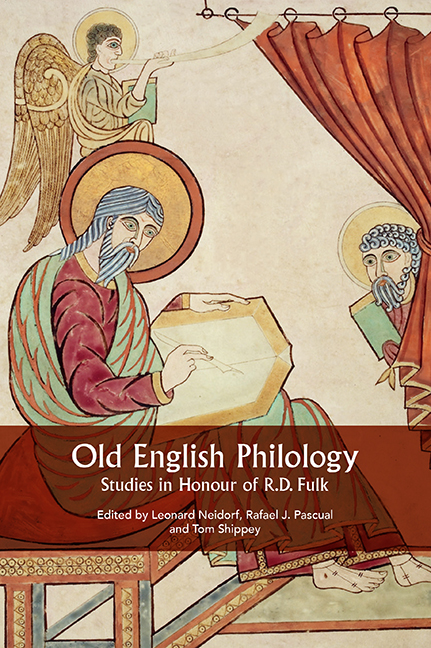Book contents
- Frontmatter
- Contents
- List of Illustrations
- Acknowledgements
- List of Contributors
- Introduction: R.D. Fulk and the Progress of Philology
- 1 Sievers, Bliss, Fulk, and Old English Metrical Theory
- 2 Ictus as Stress or Length: The Effect of Tempo
- 3 Metrical Criteria for the Emendation of Old English Poetic Texts
- 4 The Suppression of the Subjunctive in Beowulf: A Metrical Explanation
- 5 Metrical Complexity and Verse Placement in Beowulf
- 6 Alliterating Finite Verbs and the Origin of Rank in Old English Poetry
- 7 Prosody-Meter Correspondences in Late Old English and Poema Morale
- 8 The Syntax of Old English Poetry and the Dating of Beowulf
- 9 The Anglo-Saxons and Superbia: Finding a Word for it
- 10 Old English gelōme, gelōma, Modern English loom, lame, and Their Kin
- 11 Worm: A Lexical Approach to the Beowulf Manuscript
- 12 Wulfstan, Episcopal Authority, and the Handbook for the Use of a Confessor
- 13 Some Observations on e-caudata in Old English Texts
- 14 The Poetics of Poetic Words in Old English
- 15 Dream of the Rood 9b: A Cross as an Angel?
- 16 The Fate of Lot’s Wife: A ‘Canterbury School’ Gloss in Genesis A
- 17 Metrical Alternation in The Fortunes of Men
- 18 The Originality of Andreas
- 19 The Economy of Beowulf
- 20 Beowulf Studies from Tolkien to Fulk
- The Writings of R.D. Fulk
- Index
- Tabula Gratulatoria
- Anglo-Saxon Studies
11 - Worm: A Lexical Approach to the Beowulf Manuscript
Published online by Cambridge University Press: 29 May 2021
- Frontmatter
- Contents
- List of Illustrations
- Acknowledgements
- List of Contributors
- Introduction: R.D. Fulk and the Progress of Philology
- 1 Sievers, Bliss, Fulk, and Old English Metrical Theory
- 2 Ictus as Stress or Length: The Effect of Tempo
- 3 Metrical Criteria for the Emendation of Old English Poetic Texts
- 4 The Suppression of the Subjunctive in Beowulf: A Metrical Explanation
- 5 Metrical Complexity and Verse Placement in Beowulf
- 6 Alliterating Finite Verbs and the Origin of Rank in Old English Poetry
- 7 Prosody-Meter Correspondences in Late Old English and Poema Morale
- 8 The Syntax of Old English Poetry and the Dating of Beowulf
- 9 The Anglo-Saxons and Superbia: Finding a Word for it
- 10 Old English gelōme, gelōma, Modern English loom, lame, and Their Kin
- 11 Worm: A Lexical Approach to the Beowulf Manuscript
- 12 Wulfstan, Episcopal Authority, and the Handbook for the Use of a Confessor
- 13 Some Observations on e-caudata in Old English Texts
- 14 The Poetics of Poetic Words in Old English
- 15 Dream of the Rood 9b: A Cross as an Angel?
- 16 The Fate of Lot’s Wife: A ‘Canterbury School’ Gloss in Genesis A
- 17 Metrical Alternation in The Fortunes of Men
- 18 The Originality of Andreas
- 19 The Economy of Beowulf
- 20 Beowulf Studies from Tolkien to Fulk
- The Writings of R.D. Fulk
- Index
- Tabula Gratulatoria
- Anglo-Saxon Studies
Summary
Worms will turn According to the Dictionary of Old English Corpus, wyrm as a simplex occurs approximately 325 times in the extant literature, and it is found in a variety of texts (Healey 1998–). The wide distribution of wyrm may have something to do with the word's polysemy. When students of Anglo-Saxon literature see or hear this word, the image that first comes to their minds is probably that of the fire dragon of Beowulf. We are also familiar with the wyrm in the book-moth riddle of the Exeter Book, a creature that eats away its own habitat, both the parchment and the ink, without, however, digesting the non-material matter of the codex. The literal answer of this riddle is the insect, and as such the wyrm is synonymous with the first word of the text, that is, moððe (‘moth’). This word seems to serve as a generic term for small, and often crawling, insects, and as such it may refer to, for instance, silkworms or creatures found in day-old manna (e.g. Clemoes 1997: 533, and Marsden 2008: 111). Wyrm may also be used as an element of compounds to gloss Latin words. The Dictionary of Old English Corpus shows that bombex may be glossed as sīdwyrm (‘silk-worm’), and gurgulio as cawelwyrm (lit. ‘cabbage-worm’; ‘caterpillar’ [?]). The same glossator also uses the phrase hundes wyrm (lit. ‘dog's worm’) for ricinus (‘tick’).
Furthermore, the word wyrm refers to snakes and other creeping animalia, and as such the plural form wyrmas is often juxtaposed with wilddēor (‘wild animals’). For those of us who are used to Linnean taxonomy and the Darwinian tree of evolution, the Anglo-Saxon practice of applying the same word to insects and reptiles may seem rather curious. Etymologically speaking – and here I rely on Julius Pokorny’s Indogermanisches etymologisches Wörterbuch – the Old English wyrm ultimately comes from the Indo-European ųer- (‘to turn, to bend’). Hence the polysemy of this word may be understood as a legacy of its etymology pertaining either to the creature's shape or manner of movement. But this lexical double-duty is apparently not a pan-European phenomenon.
- Type
- Chapter
- Information
- Old English PhilologyStudies in Honour of R.D. Fulk, pp. 200 - 214Publisher: Boydell & BrewerPrint publication year: 2016
- 1
- Cited by



